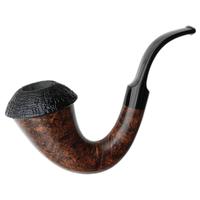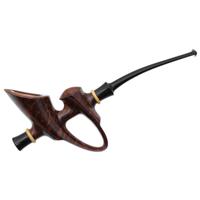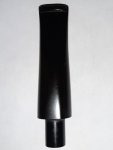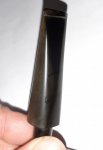As you may know, we have a hot debate about water flushing method suggested by @jpmcwjr. Some suggested that running hot/warm water through vulcanite stems will cause oxidation. Even I faced the same problem after water flushing my pipes and their vulcanite stems. Later, @jpmcwjr suggested that the warm water doesn't cause the oxidation, but reveals it. Is he right? Let's see:
I had been using rubber pipe bits on all of my stems for 5 years. If you check the below picture of the vulcanite stem of my Nording pipe you will realize that the part of the stem that had been covered by the pipe bit is not affected even after washing it with warm water.
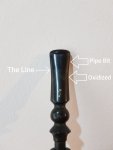
I know it is very difficult to please you folks, so here is another picture. This time it's the vulcanite P-lip stem of my Peterson Standard System 31.
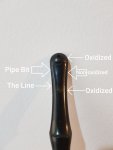
And here is a picture of the acrylic stem of my Stanwell pipe, no difference at all.
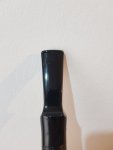
By the way, after 5 years of usage, I quit using the pipe bits.
I had been using rubber pipe bits on all of my stems for 5 years. If you check the below picture of the vulcanite stem of my Nording pipe you will realize that the part of the stem that had been covered by the pipe bit is not affected even after washing it with warm water.

I know it is very difficult to please you folks, so here is another picture. This time it's the vulcanite P-lip stem of my Peterson Standard System 31.

And here is a picture of the acrylic stem of my Stanwell pipe, no difference at all.

By the way, after 5 years of usage, I quit using the pipe bits.




